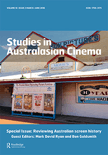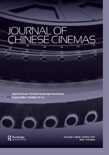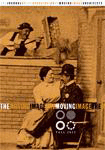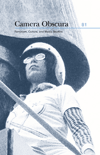
Studies in Australasian Cinema
Scope & Guideline
Engaging with the Evolution of Film Theory and Criticism
Introduction
Aims and Scopes
- Cultural Representation and Identity:
The journal explores how film serves as a medium for cultural representation, particularly focusing on Indigenous perspectives, ethnic diversity, and the portrayal of gender and sexuality in Australasian cinema. - Historical Analysis of Cinema:
It delves into the historical development of Australian and New Zealand cinema, examining genres, production practices, and significant movements that have shaped the film industry. - Innovative Filmmaking Practices:
The journal highlights innovative approaches to filmmaking, including hybrid documentary forms, collaborative practices between academia and industry, and the role of emerging technologies. - Critical Theory and Film Studies:
It engages with critical theories relevant to film studies, applying frameworks from feminist theory, post-colonial studies, and queer theory to analyze cinematic texts and practices. - Educational Practices in Film:
The journal addresses educational methodologies related to film studies and production, investigating how film schools and educational institutions contribute to the creative landscape.
Trending and Emerging
- Disruptive and Hybrid Narratives:
There is a growing focus on disruptive narrative forms, particularly in documentaries and experimental films. This trend reflects a broader interest in challenging traditional storytelling techniques and exploring new ways of narrative construction. - Intersectionality in Film:
Recent publications increasingly emphasize intersectional approaches, examining how race, gender, sexuality, and class intersect within the cinematic context, thus highlighting diverse voices and experiences. - Environmental and Social Themes:
Emerging themes related to environmentalism and social justice are becoming more prominent, with filmmakers using cinema to address pressing global issues, such as climate change and social inequities. - Queer Cinema and Representation:
The journal has seen a rise in discussions around queer cinema, focusing on representation, identity, and the contributions of LGBTQ+ filmmakers within the Australasian context. - Collaborative Filmmaking Practices:
There is a notable trend towards exploring collaborative practices in filmmaking, particularly between academic institutions and the film industry, which reflects an interest in co-creating knowledge and fostering innovation.
Declining or Waning
- Traditional Genre Analysis:
There seems to be a waning interest in conventional genre studies, particularly those that do not intersect with contemporary issues of identity or cultural representation. The focus has shifted towards more innovative and hybrid forms of storytelling. - Mainstream Film Critique:
Critiques of mainstream cinema, especially those that do not engage with issues of socio-cultural impact, have decreased. The journal's current trajectory favors analyses that link cinema to broader cultural and political contexts. - Historical Documentations of the Film Industry:
While historical analysis remains relevant, there is a noticeable decline in papers solely focused on the historical documentation of the film industry without a contemporary lens, as the journal emphasizes present-day implications and narratives.
Similar Journals

CINEASTE
Exploring the Depths of Cinematic ArtistryCINEASTE is a distinguished journal dedicated to the critical exploration of cinema, providing a platform for scholars, filmmakers, and enthusiasts to engage with the complexities of film studies. Established and published by CINEASTE, this periodical serves as a vital resource for those interested in the intersection of visual arts and performing arts. Although it is not currently offered as Open Access, CINEASTE remains a respected publication within the academic community, having been indexed in Scopus until 2016. With an ISSN of 0009-7004, it has established itself despite its lower ranking in the arts and humanities category, reflecting the competitive nature of this field. Researchers, students, and professionals alike will find ample opportunities for insightful discussion and scholarly contributions to the evolving landscape of cinematic discourse. CINEASTE continues to uphold its mission of enhancing film scholarship, making it a crucial reference point for anyone eager to deepen their understanding of cinema's artistic and cultural significance.

Journal of Chinese Cinemas
Illuminating the Cultural Tapestry of Chinese FilmThe Journal of Chinese Cinemas, published by Routledge Journals, Taylor & Francis Ltd, is a leading platform dedicated to advancing the field of film studies with a focus on cinema from China. With an ISSN of 1750-8061 and an E-ISSN of 1750-807X, this journal provides a comprehensive examination of the cultural, social, and political dynamics inherent in Chinese cinema. Ranked in the Q3 category for Communication and Q1 for Visual Arts and Performing Arts in 2023, it stands out in the academic landscape, particularly noted for its innovative research and diverse discourse. It holds a respectable position in Scopus rankings, coming in at #219 within Visual Arts and Performing Arts, indicating its growing impact among scholars and practitioners alike. With its commitment to publishing high-quality research from 2012 onwards, the journal serves as an essential resource for researchers, professionals, and students eager to deepen their understanding of the evolving landscape of Chinese cinema.

CINEFORUM
Celebrating the Vibrancy of Visual and Performing ArtsCINEFORUM is a distinguished journal published by the FEDERAZIONE ITALIANA CINEFORUM, focusing on the vibrant field of Visual Arts and Performing Arts. With an ISSN of 0009-7039, this journal serves as a significant platform for researchers and practitioners interested in critical discussions and analyses pertaining to cinema and performance. Although coverage in Scopus discontinued in 2020, CINEFORUM has established its standing with a category ranking in the Q4 quartile for Visual Arts, reflecting its niche yet passionate readership in the arts community. Based in Bergamo, Italy, the journal aims to foster a deeper understanding of cinematic and performative texts, offering insights and scholarly contributions that enhance the discourse within these artistic domains. Catering to an audience that includes researchers, professionals, and students, CINEFORUM remains an essential resource for those looking to explore the intersection of theory and practice in cinema and performing arts.

FILM CRITICISM
Unveiling the Layers of Film NarrativesFILM CRITICISM is a prestigious open-access journal dedicated to the study and review of cinema, offering a platform for scholars, critics, and students to engage deeply with the evolving landscape of film. Published by Film Criticism and based in the United States at Allegheny College, this journal has been contributing to film studies since 2002, with recent issues spanning from 2023 to 2024. Registered under ISSN 0163-5069, it is recognized in the Visual Arts and Performing Arts categories, achieving a commendable rank of #372 out of 667 in Scopus, placing it in the 44th percentile of its field. With an open-access policy implemented since 2016, FILM CRITICISM not only broadens accessibility to scholarly work but also enhances the dialogue around cinematic narratives, theories, and critiques. The journal's relevance is underscored by its current Q3 ranking, making it an essential resource for researchers and professionals alike who are invested in the critical examination of film.

Film-Philosophy
Engaging with the Philosophical Dimensions of FilmFilm-Philosophy is an esteemed academic journal published by Edinburgh University Press, specializing in the intersection of film studies and philosophical discourse. Since its launch in 1998, this Open Access journal has provided a platform for scholarly debates and innovative research, allowing for free and unrestricted access to its content, which has significantly contributed to the global dialogue on visual culture. With a commendable impact illustrated by its Q1 ranking in Visual Arts and Performing Arts and Q2 in Philosophy, the journal sits within the top quartile of its field. Operating from the United Kingdom, Film-Philosophy is committed to fostering a multidisciplinary approach, inviting contributions from researchers, professionals, and students alike. By engaging with critical theories and the aesthetics of cinema, the journal stands as a vital resource for understanding the philosophical implications of film and its cultural significance.

CINEJ Cinema Journal
Pioneering Conversations in Cinematic Discourse.CINEJ Cinema Journal, published by the University of Pittsburgh Library System, stands as a pivotal platform for scholarly discourse in the dynamic field of cinema studies. With an ISSN of 2159-2411 and an E-ISSN of 2158-8724, this Open Access journal has been dedicated to disseminating high-quality research since its inception in 2011. CINEJ provides an essential resource for researchers, practitioners, and students alike, exploring varied dimensions of cinema, including its cultural, historical, and technological implications. The journal is committed to fostering interdisciplinary dialogue, making it a vital asset for those seeking to deepen their understanding of cinema as an art form and social phenomenon. By engaging with contemporary issues and trends in the cinematic landscape, CINEJ encourages contributions that illuminate the intersection of film and social inquiry, ensuring its relevance in today’s academic ecosystem.

Moving Image
Charting New Territories in Moving Image ResearchMoving Image is a distinguished academic journal published by University of Minnesota Press, dedicated to the exploration and critical analysis of visual culture. With an ISSN of 1532-3978 and an E-ISSN of 1542-4235, this journal plays a vital role in advancing scholarship in the fields of Conservation, Visual Arts, and Performing Arts, offering insights from its notable publication history from 2013 to 2019 and again from 2021 to 2022. While it currently does not offer open access options, the journal is recognized as a crucial platform for disseminating research, reflected in its rankings—#442/667 in Visual Arts and Performing Arts and #87/103 in Conservation according to Scopus. Despite its placement in the Q4 quartile for both fields, Moving Image remains a key resource for scholars, students, and practitioners interested in the intricate dynamics of moving images in contemporary culture. Its commitment to fostering dialogue and innovation in visual studies ensures its relevance and influence within the academic community.

Asian Cinema
Exploring the Rich Tapestry of Asian Cinematic ArtsAsian Cinema is a distinguished academic journal dedicated to exploring the vibrant landscape of cinema across Asia, published by INTELLECT LTD, a recognized name in scholarly publishing. With its ISSN 1059-440X and E-ISSN 2049-6710, this journal has carved a niche within the realms of Communication and Visual Arts and Performing Arts, holding a 2023 Q4 ranking in Communication and a more favorable Q2 ranking in Visual Arts and Performing Arts. Operating out of the UK, specifically at THE MILL, PARNALL RD, BRISTOL BS16 3JG, ENGLAND, Asian Cinema provides a platform for interdisciplinary dialogues, critiques, and analyses that contribute significantly to the understanding of cinema as a cultural artifact. Acknowledged for its robust contribution to scholarly research, the journal commands a Scopus rank of 151 out of 667 in Visual Arts and Performing Arts, placing it in the 77th percentile, while achieving a 366 out of 511 rank in Communication, reflecting its ongoing relevance in the field. Although it operates under a traditional access model, Asian Cinema remains vital for researchers, professionals, and students alike, enriching academic discourse and providing valuable insights into the rapidly evolving cinematic practices across Asia.

Etica & Cine
Advancing Critical Discourse in Visual CultureEtica & Cine is a distinguished open-access journal published by the University of Buenos Aires, Faculty of Psychology, dedicated to the interdisciplinary field of ethics in cinema and visual culture. With the ISSN 2250-5660 and E-ISSN 2250-5415, this journal has been a vital platform for researchers, professionals, and students since its inception in 2011, providing a space for critical discourse surrounding the ethical dimensions of film and media. The journal aims to foster scholarly dialogue by publishing high-quality articles that explore the philosophical, social, and psychological implications of filmic representations. While the journal's H-index is yet to be established, its commitment to open access ensures that valuable insights are readily available to a global audience, thus enhancing its significance in academic and professional circles. As the conversation around ethics in cinema continues to evolve, Etica & Cine stands as an essential resource for anyone engaged in this vital area of study.

CAMERA OBSCURA
Challenging Norms Through the Lens of Gender StudiesCAMERA OBSCURA, an esteemed journal published by DUKE UNIVERSITY PRESS, serves as a vital platform at the intersection of Visual Arts and Gender Studies. With its ISSN 0270-5346 and E-ISSN 1529-1510, this journal has been an influential contributor to critical discussions in cultural theory and visual culture from 2002 to 2024. Notably categorized in the Q4 quartile for Gender Studies and Q2 for Visual Arts and Performing Arts in 2023, CAMERA OBSCURA boasts a Scopus rank that reflects its growing impact within the academic community. Although currently not offered as an open-access publication, its rigorous peer-reviewed content remains crucial for researchers, professionals, and students alike, facilitating a deeper understanding of how visual representation shapes and is shaped by societal constructs. Set in the heart of the United States, the journal's commitment to exploring the complexities of gendered visuality emphasizes its importance within contemporary scholarship in these vibrant fields.